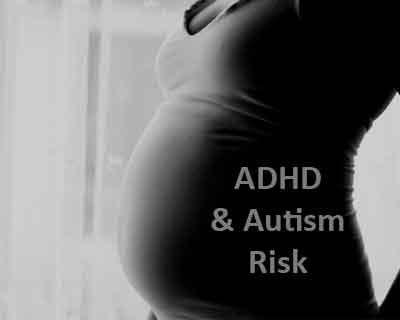- Home
- Editorial
- News
- Practice Guidelines
- Anesthesiology Guidelines
- Cancer Guidelines
- Cardiac Sciences Guidelines
- Critical Care Guidelines
- Dentistry Guidelines
- Dermatology Guidelines
- Diabetes and Endo Guidelines
- Diagnostics Guidelines
- ENT Guidelines
- Featured Practice Guidelines
- Gastroenterology Guidelines
- Geriatrics Guidelines
- Medicine Guidelines
- Nephrology Guidelines
- Neurosciences Guidelines
- Obs and Gynae Guidelines
- Ophthalmology Guidelines
- Orthopaedics Guidelines
- Paediatrics Guidelines
- Psychiatry Guidelines
- Pulmonology Guidelines
- Radiology Guidelines
- Surgery Guidelines
- Urology Guidelines
Paracetamol During Pregnancy May Up ADHD, Autism Risk In Kids

London : Paracetamol, a common drug used extensively during pregnancy, maybe linked with autism spectrum as well as attention-related and hyperactivity symptoms in newborns, the first-of-its-kind study has found.
Scientists found an independent association between the use of this drug in pregnancy and autism spectrum symptoms in children. It is also the first study to report different effects on boys and girls.
Comparing persistently to non-exposed children, the study has found an increase of 30 per cent in the risk of detriment to some attention functions, and an increase of two clinical symptoms of autism spectrum symptoms in boys.
Researchers at Center for Research in Environmental Epidemiology (CREAL) in Spain recruited 2644 mother-child pairs in a birth cohort study during pregnancy.
About 88 per cent were evaluated when the child was one year old, and 79.9 per cent were evaluated when they were five years old.
Mothers were asked about their use of paracetamol during pregnancy and the frequency of use was classified as never, sporadic, or persistent.
Around 43 per cent of children evaluated at age one and 41 per cent assessed at age five were exposed to any paracetamol at some point during the first 32 weeks of pregnancy.
When assessed at age five, exposed children were at higher risk of hyperactivity or impulsivity symptoms. Persistently exposed children in particular showed poorer performance on a computerised test measuring inattention, impulsivity and visual speed processing.
Boys also showed more autism spectrum symptoms when persistently exposed to paracetamol.
"Although we measured symptoms and not diagnoses, an increase in the number of symptoms that a child has, can affect him or her, even if they are not severe enough to warrant a clinical diagnosis of a neurodevelopmental disorder," said lead author Claudia Avella-Garcia, researcher at CREAL, an IS Global allied centre in Barcelona.
"Paracetamol could be harmful to neurodevelopment for several reasons. First of all, it relieves pain by acting on cannabinoid receptors in the brain," said Jordi Julvez, also a researcher at CREAL.
"Since these receptors normally help determine how neurons mature and connect with one another, paracetamol could alter these important processes," Julvez said.
"It can also affect the development of the immune system, or be directly toxic to some foetuses that may not have the same capacity as an adult to metabolise this drug, or by creating oxidative stress," he said.
"The male brain may be more vulnerable to harmful influences during early life," said Avella-Garcia.
The study concluded that the widespread exposure of infants to paracetamol in utero could increase the number of children with ADHD or autism spectrum symptoms.
The findings were published in the International Journal of Epidemiology.

Disclaimer: This site is primarily intended for healthcare professionals. Any content/information on this website does not replace the advice of medical and/or health professionals and should not be construed as medical/diagnostic advice/endorsement or prescription. Use of this site is subject to our terms of use, privacy policy, advertisement policy. © 2020 Minerva Medical Treatment Pvt Ltd